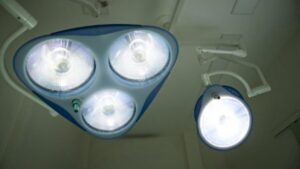Scott Power: ASX health stocks slide but some shine through the gloom

Amid a sector slide, a few ASX health stocks broke through the storm clouds. Pic: Getty Images
- ASX health sector fell 1.8% for the week, while broader market dropped 3.86% in the same period
- FDA confirms Animal Rule and PRV potential for Island Pharmaceutical’s Galidesivir in Marburg
- Clever Culture identifies more than $45 million in potential upfront sales revenue from its existing Big seven pharmaceutical clients
Healthcare and life sciences expert Scott Power, who has been a senior analyst with Morgans Financial for 27 years, gives his take on the ASX healthcare sector for the week and his ‘Powerplay’ stock pick.
The ASX healthcare sector ended the week down, following a sharp sell-off on Wall Street, where declines in major tech stocks spread like a contagion through global markets.
At 12.30pm (AEDT) on Friday the ASX Health Care Index (ASX:XHJ) was -1.76% for the past week, while the benchmark S&P/ASX 200 (ASX:XJO) fell 3.86%.
“We’ve had a sell off in the big tech names around the world and there’s expectations that interest rate cuts in the US will slow so there’s been a rotation out of growth-orientated companies,” Power said.
“In Australia you’ve got high-priced tech names coming off as well as the banks that have had very strong runs, so there’s been a bit of a market shakeout.
“The market in particular sectors has run very hard so a pullback is healthy and doesn’t dent our confidence in a strong finish to the year continuing into next year.”
Despite the overall poor performance for the week there was still plenty of healthy reports coming out from ASX healthcare names.
Island achieves key regulatory milestone
Island Pharmaceuticals (ASX:ILA) was up ~30% on Tuesday after the US Food and Drug Administration (FDA) confirmed its antiviral candidate Galidesivir, for use against the deadly Marburg virus, is eligible to advance toward approval under the specialised Animal Rule pathway.
The Animal Rule is reserved for life-threatening pathogens where human trials are not feasible or ethical, including filoviruses such as Marburg and Ebola, which cause severe haemorrhagic fever.
The FDA also advised that Galidesivir would qualify for a Tropical Disease Priority Review Voucher (PRV) upon approval under the Animal Rule.
A PRV is one of the most valuable incentives offered by the FDA in drug development, with recent vouchers selling for US$100–155 million on the open market.
Island received written responses to questions posed in a Type C meeting request, with the FDA also providing valuable guidance on Galidesivir’s clinical development program to advance its approval.
“The pathway they’ve been awarded by the FDA enables a quick path to starting a clinical trial and getting accelerated approval for a virus which has absolutely no treatment at the moment and a high death rate,” Power said.
Dimerix completes seventh IDMC phase III trial review
Dimerix (ASX:DXB) has announced successful completion of the seventh scheduled Independent Data Monitoring Committee (IDMC) phase III ACTION3 trial of its lead drug DMX-200 in rare kidney disease Focal Segmental Glomerulosclerosis (FSGS).
The review has again found no safety concerns and recommended the study continue unchanged, reinforcing the continued safety profile of the treatment.
With 271 out of a planned ~286 patients now enrolled, the trial is nearing full recruitment and maintains momentum toward key clinical milestones.
Power said upcoming catalysts include the part II interim analysis, an eighth IDMC review in early/mid 2026, as well as potential regulatory discussions around accelerated approval pathways based on proteinuria and kidney function endpoints derived from the upcoming interim analysis.
“DXB’s ACTION3 trial just passed another critical safety checkpoint, reinforcing DMX-200’s potential as a best-in-class, well-tolerated therapy for FSGS which remains a disease with few options and high unmet need,” Morgans’ healthcare analyst Iain Wilkie wrote in a note to clients.
“With strong patient recruitment, a clean safety record, and major catalysts ahead (including further interim analyses and potential licensing deals), DXB remains one to watch as it advances toward possible accelerated approval.”
Trial results reinforce case for CRT and EBR’s WiSE tech
In what could translate to a positive for EBR Systems (ASX:EBR) feedback from the 18th Asia Pacific Heart Rhythm Society (APHRS) conference points to a cooling in physician sentiment around conduction-system pacing (CSP) following a key trial.
EBR has begun the gradual rollout of its WiSE device for cardiac resynchronisation therapy (CRT), the world’s first and only wireless solution for pacing the left side of the heart, after receiving FDA approval in mid-April with EBR embarking on a gradual rollout.
The PhysioSync-HF, presented at the European Society of Cardiology (ESC) last September was the first large, multicentre randomised trial directly comparing CSP with standard CRT.
The study showed CSP to be less effective than CRT, tempering earlier expectations that CSP might eventually replace traditional CRT in broader heart failure populations.
“For EBR, we believe this shift is strategically favourable as physicians are seeking alternatives that preserve the physiologic benefits of CSP without the drawbacks of transvenous delivery, strengthening interest in WiSE-guided leadless CSP,” Morgans’ healthcare analyst Derek Jellinek wrote in a note to clients.
He wrote doctors starting to use WiSE seem increasingly inclined to use it not just for difficult or previously untreatable CRT cases, but also for new heart failure patients suitable for CRT from the outset.
“These developments support our view that WiSE remains uniquely positioned in the evolving pacing landscape, with strengthening clinical pull-through and expanding addressable markets,” Jellinek wrote.
“With a sound commercial strategy, along with incentivised reimbursement lowering adoption barriers, we continue to view EBR as well placed to build a profitable medical device business in the cardiac resynchronisation therapy space.”
Morgans has a buy rating with a 12-month target price of $2.86.
Race to expand its clinical program
Race Oncology (ASX:RAC) plans to capture significant value for its next-generation bisantrene formulation RC220 across two major cancer markets after a key discovery announced in October.
The company identified, for the first time, how (E,E)-bisantrene works, finding it binds to cancer-linked structures in DNA and RNA called G-quadruplex, which can shut down key cancer growth pathways, further strengthening RC220’s scientific and commercial case.
A phase III trial in Acute Myeloid Leukaemia (AML), and a phase 1a/b trial in non-small cell lung cancer, based on this G-quadruplex binding mechanism of action are now planned.
The Race share price is up ~125% YTD after a series of strong announcements.
“They have sufficient funds to run these two trials with around $11 million cash on their balance sheet but also piggy back options, which were issued a number of years ago and are now well in the money so are being exercised,” Power said.
Bisantrene was first developed in the 1970s and 1980s by Lederle Laboratories as a potentially less cardiotoxic alternative to anthracyclines, the common standard-of-care chemotherapy for many cancers. However, poor blood solubility limited its use and development was halted despite promising anticancer activity.
Race addressed the solubility challenge through reformulation, demonstrating that RC220 can both prevent anthracycline-induced cardiotoxicity and enhance anticancer effects.
“They’ve basically taken an old compound and weaved their magic and turned it into something that is way more effective,” Power said.
Cogstate building traction in CNS trial space
Morgans attended the CogState (ASX:CGS) inaugural shareholder day in November, which Power said provided valuable insights into its strategy to deliver faster, more reliable central nervous system trial outcomes through technology-driven solutions and global partnerships.
The neuroscience tech company is focused on digital cognitive assessment and clinical trial innovation. Its offerings include rapid, sensitive computerised cognitive tests, electronic Clinical Outcome Assessment (eCOA) tools, and endpoint data quality assurance services.
It partners with pharmaceutical and biotech companies to assess the cognitive impact of investigational compounds in clinical trials.
The company has a major collaboration with Medidata integrating eCOA and AI-driven data solutions to improve trial efficiency and accuracy. The company expects Phase III opportunities to emerge in 2026, with significant traction anticipated in 2027.
Cogstate is investing in automation, smart data governance, and AI tools such as digital avatars for rater training and automated assessment reviews.
“We were able to view some of this work and speak with the management team developing these systems,” Power said.
“Management commented that once these technologies are adopted operational and financial efficiencies will follow.”
The company is entering new therapeutic areas, including psychiatry, Parkinson’s Disease, sleep, and rare diseases, while scaling rater certification programs to maintain compliance and data quality.
“Cogstate’s major customer Eli Lilly is undertaking a trial (Trailblazer-ALZ-3) with its product donanemab aimed at the pre-symptomatic stage of the disease,” Power said.
“The trial is a time-to-event design which means it could read out earlier, perhaps within 9 months. If this trial is successful, it could expand the addressable market and reinforce CGS’ leadership in early-stage Alzheimer’s Disease.”
Consensus target price is $3.28, representing ~21% upside to the current share price.
Power’s Powerplay: Clever Culture is filling its plate
Clever Culture Systems (ASX:CC5) is Power’s pick of the week after holding its AGM this week and identifying more than $45 million in potential upfront sales revenue from its existing big seven pharmaceutical clients.
Clever Culture’s APAS Independence is the only FDA cleared AI technology for automated culture plate reading and is being sold to microbiology laboratories in the pharmaceutical manufacturing sector for the reading of environmental monitoring culture plates.
The company recently launched its APAS settle plates (90mm) and the newly launched contact plates (55mm), as well as strategies for global validation and rollout.
With the August launch of 55mm contact plates adding to the 90mm settle plates APAS now provides a fully automated solution to monitor production environments including air, surfaces and personnel for potential microbial growth.
CC5 reported strong progress for Q1 FY26 with Boehringer Ingelheim adopting APAS Independence, installations at Novo Nordisk and Bristol Myers Squibb, and AstraZeneca placing its tenth order.
Pfizer extended its evaluation to contact plates after positive results from a 6,000-plate study showing 100% detection accuracy.
CC5 estimates a sales pipeline exceeding 150 instruments, representing more than $75m in potential upfront sales and up to $15m in annual recurring revenue (ARR). From its existing clients alone, the opportunity could be up to 95 instruments (~$45m upfront, $10m ARR).
“What we’re observing is the company really starting to build its sales pipeline,” Power said.
“There’s an opportunity to expand significantly among its existing customer base and then also to others.
“They’ve got seven of the top 10 pharmaceuticals companies, so there’s still three more to go.”
The views, information, or opinions expressed in the interview in this article are solely those of the interviewee and do not represent the views of Stockhead.
Stockhead has not provided, endorsed or otherwise assumed responsibility for any financial product advice contained in this article.
Scott Power owned shares in EBR and CC5 at the time of writing this article, and Morgans Corporate was a joint lead manager and underwriter to the placement of shares for EBR Systems Ltd in May 2025 and may receive fees in this regard.
At Stockhead, we tell it like it is. While Island Pharmaceuticals, Dimerix, EBR Systems, Race Oncology and Clever Culture Systems and are Stockhead advertisers, the companies did not sponsor this article.

UNLOCK INSIGHTS
Discover the untold stories of emerging ASX stocks.
Daily news and expert analysis, it's free to subscribe.
By proceeding, you confirm you understand that we handle personal information in accordance with our Privacy Policy.








